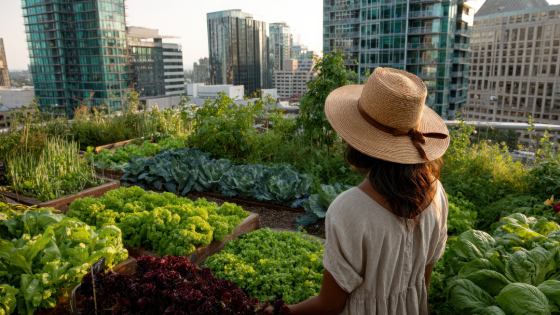In today’s rapidly urbanizing world, cities are becoming denser, greener spaces are shrinking, and the effects of climate change are growing more evident. However, an inspiring movement is taking root across urban areas — urban gardening. From rooftop gardens to balcony planters and community farms, urban gardening is emerging as a simple yet powerful way to fight climate change while improving city life. It connects people back to nature, reduces pollution, and contributes to a more sustainable future.

Urban gardening helps combat climate change in several ways. One of the most direct impacts is the reduction of carbon dioxide (CO₂) in the atmosphere. Plants naturally absorb CO₂ during photosynthesis, converting it into oxygen and organic matter. When cities encourage the growth of green spaces, even on a small scale, it collectively contributes to lowering carbon emissions. A few rooftop gardens across a city may seem insignificant, but together they act as small carbon sinks that help offset urban pollution.
Another significant contribution of urban gardening is the reduction of the urban heat island effect. Cities are filled with concrete, glass, and metal, which absorb and trap heat, making urban areas several degrees hotter than rural surroundings. This heat not only increases energy consumption for air conditioning but also worsens air pollution. Plants, however, cool the environment naturally through a process called transpiration. Urban gardens — whether on terraces, vertical walls, or community spaces — can help lower local temperatures, reduce energy demand, and make cities more livable.
Urban gardening also plays a vital role in improving air quality. Plants act as natural air filters, trapping dust, pollutants, and harmful gases. They absorb nitrogen dioxide, sulfur dioxide, and other airborne contaminants. By introducing more greenery into urban spaces, residents can enjoy cleaner air and a healthier environment. For those living in polluted cities, even small gardens can provide much-needed relief from smog and dust.
Food production is another area where urban gardening makes a big difference. Modern agriculture and food transportation systems contribute heavily to greenhouse gas emissions. When food is grown locally — in balconies, backyards, or community plots — it reduces the need for packaging, transport, and refrigeration. This, in turn, lowers the overall carbon footprint of food consumption. Urban gardening encourages sustainable, organic practices that eliminate the use of harmful pesticides and fertilizers, which are known to release greenhouse gases and pollute waterways.
Besides its environmental benefits, urban gardening brings social and psychological advantages that strengthen communities. It creates opportunities for neighbors to come together, share knowledge, and collaborate on sustainability projects. Community gardens often become educational spaces where people learn about composting, recycling, and climate action. Moreover, gardening reduces stress, promotes mental well-being, and nurtures a sense of responsibility toward the planet. When individuals actively take part in growing their own plants or vegetables, they develop a deeper appreciation for nature’s cycles and resources.
Technology and innovation have made urban gardening even more accessible. Hydroponics, vertical farming, and smart irrigation systems allow city dwellers to grow plants in limited spaces without soil or excessive water use. Many cities are now promoting green roofs and walls as part of urban design policies to tackle pollution and improve sustainability. These initiatives not only beautify the city but also help regulate temperatures, conserve energy, and enhance biodiversity.
In conclusion, urban gardening is much more than a hobby — it’s a meaningful act of environmental responsibility. Every plant grown in an apartment, every rooftop turned green, and every community garden established adds to a collective effort to fight climate change. It is proof that small, consistent actions can lead to big environmental improvements. By embracing urban gardening, city dwellers can play a crucial role in building greener, cleaner, and healthier cities for future generations. The seeds we plant today can truly shape the climate of tomorrow.